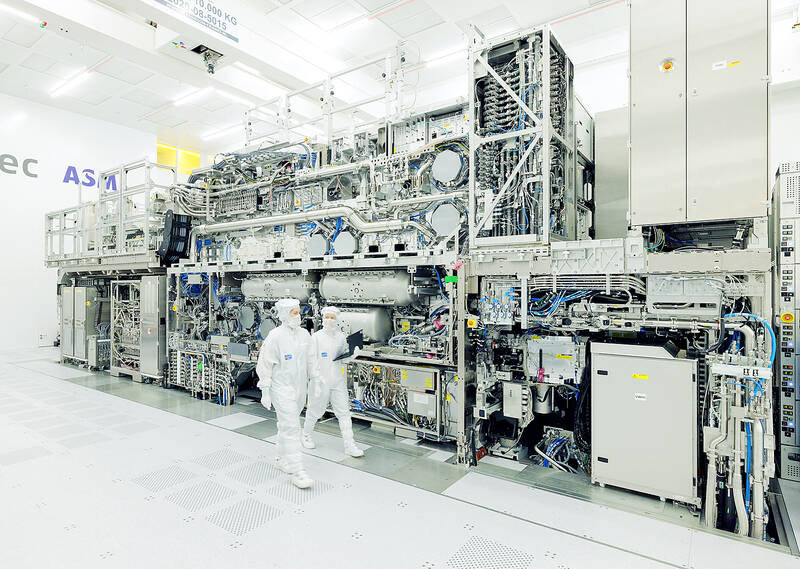ASML Holding NV and Taiwan Semiconductor Manufacturing Co (TSMC, 台積電) have ways to disable the world’s most sophisticated chipmaking machines in the event that China invades Taiwan, people familiar with the matter said.
Officials from the US government have privately expressed concerns to both their Dutch and Taiwanese counterparts about what happens if Chinese aggression escalates into an attack on the nation responsible for producing the vast majority of the world’s advanced semiconductors, two of the people said, speaking on condition of anonymity.
ASML reassured officials about its ability to remotely disable the machines when the Dutch government met with the company on the threat, two others said.

Photo: ASML / Michel de Heer via Reuters
The Netherlands has run simulations on a possible invasion to better assess the risks, they added.
Spokespeople for ASML, TSMC and the Dutch Ministry for Foreign Trade and Development Cooperation declined to comment. Spokespeople for the White House National Security Council, the US Department of Defense and the US Department of Commerce did not respond to e-mailed requests for comment.
The remote shut-off applies to Netherlands-based ASML’s line of extreme ultraviolet (EUV) machines, for which TSMC is its single biggest client. EUVs harness high-frequency light waves to print the smallest microchip transistors in existence — creating chips that have artificial intelligence uses as well as more sensitive military applications.
About the size of a city bus, an EUV requires regular servicing and updates. As part of that, ASML can remotely force a shut-off which would act as a kill switch, the people said.
The Veldhoven-based company is the world’s only manufacturer of the machines, which sell for more than 200 million euros (US$217 million) apiece.
ASML’s technology has long been subject to government interventions aimed at preventing it from falling into the wrong hands. The Netherlands prohibits the company from selling EUV machines to China, for instance, because of US fears they could lend its rival an edge in the global chip dispute.
The EUV machine has helped turn ASML into Europe’s most valuable technology stock with a market capitalization topping US$370 billion — more than double that of its client Intel Corp.
ASML has shipped more than 200 of the machines to clients outside China since they were first developed in 2016, with TSMC snatching up more of them than any other chipmaker.
EUVs require such frequent upkeep that without ASML’s spare parts they quickly stop working, the people said.
On-site maintenance of the EUVs poses a challenge because they are housed in clean rooms that require engineers to wear special suits to avoid contamination.
ASML offers certain customers joint service contracts where they do some of the routine maintenance themselves, allowing clients such as TSMC to access their own machines’ system. ASML says it cannot access its customers’ proprietary data.
TSMC chairman Mark Liu (劉德音) hinted in an interview with CNN in September last year that any invader of Taiwan would find his company’s chipmaking machines out of order.
“Nobody can control TSMC by force,” Liu said. “If there is a military invasion you will render TSMC factory non-operable.”

Application-specific integrated circuit designer Faraday Technology Corp (智原) yesterday said that although revenue this quarter would decline 30 percent from last quarter, it retained its full-year forecast of revenue growth of 100 percent. The company attributed the quarterly drop to a slowdown in customers’ production of chips using Faraday’s advanced packaging technology. The company is still confident about its revenue growth this year, given its strong “design-win” — or the projects it won to help customers design their chips, Faraday president Steve Wang (王國雍) told an online earnings conference. “The design-win this year is better than we expected. We believe we will win

Intel Corp chief executive officer Lip-Bu Tan (陳立武) is expected to meet with Taiwanese suppliers next month in conjunction with the opening of the Computex Taipei trade show, supply chain sources said on Monday. The visit, the first for Tan to Taiwan since assuming his new post last month, would be aimed at enhancing Intel’s ties with suppliers in Taiwan as he attempts to help turn around the struggling US chipmaker, the sources said. Tan is to hold a banquet to celebrate Intel’s 40-year presence in Taiwan before Computex opens on May 20 and invite dozens of Taiwanese suppliers to exchange views

Chizuko Kimura has become the first female sushi chef in the world to win a Michelin star, fulfilling a promise she made to her dying husband to continue his legacy. The 54-year-old Japanese chef regained the Michelin star her late husband, Shunei Kimura, won three years ago for their Sushi Shunei restaurant in Paris. For Shunei Kimura, the star was a dream come true. However, the joy was short-lived. He died from cancer just three months later in June 2022. He was 65. The following year, the restaurant in the heart of Montmartre lost its star rating. Chizuko Kimura insisted that the new star is still down

While China’s leaders use their economic and political might to fight US President Donald Trump’s trade war “to the end,” its army of social media soldiers are embarking on a more humorous campaign online. Trump’s tariff blitz has seen Washington and Beijing impose eye-watering duties on imports from the other, fanning a standoff between the economic superpowers that has sparked global recession fears and sent markets into a tailspin. Trump says his policy is a response to years of being “ripped off” by other countries and aims to bring manufacturing to the US, forcing companies to employ US workers. However, China’s online warriors